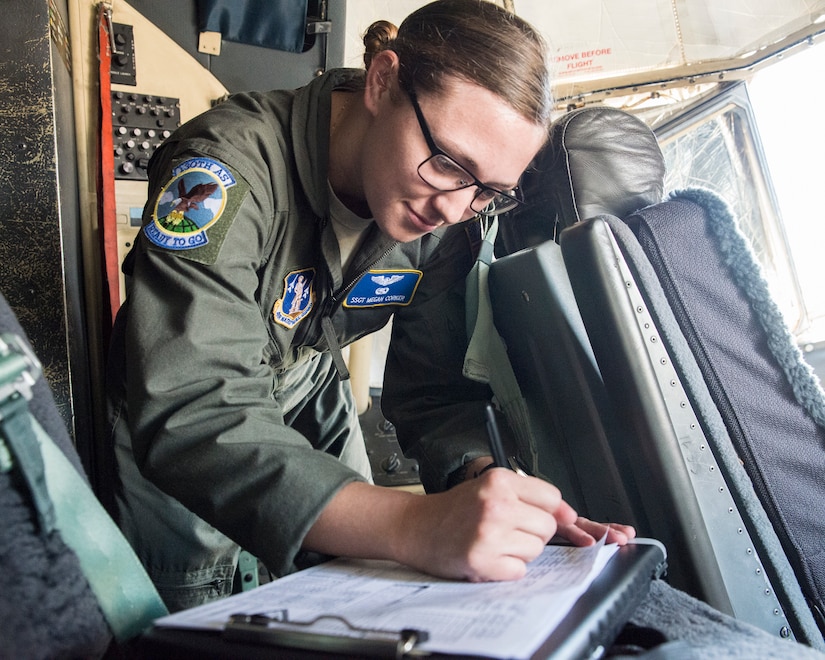By Air Force Tech. Sgt. Jessica Condit, 189th Airlift Wing
LITTLE ROCK AIR FORCE BASE, Ark. -- Air Force Staff Sgt.
Megan Corker is here training to be an Air Force flight engineer, which is an
enlisted member of a flight crew who monitors and operates the complex systems
in an aircraft.
To become a flight engineer, an airman must first have
served in one of several maintenance career fields and be selected to
participate in the program. The entire course is about 11 months long, with six
of those months spent here for academic and flying training. From C-130H
Hercules simulator training, to performing on the actual aircraft, Corker
broadened her perception and knowledge of the flight engineer career field.
“As soon as she got here we realized she was an
above-average student and we wanted to cut her training short,” said Air Force
Master Sgt. David Roles, the lead flight engineer instructor with the Arkansas’
Air National Guard’s 154th Training Squadron. “She actually only had eight of
each training event, which is not the norm. I’ve never seen anyone proficiency
advance that much before. We had to check the regulations to make sure we could
even do that.”
Inherited Drive
Support and encouragement is essential to the success of
anyone who is ready to set goals and new milestones in their life. Corker
attributes her drive to excellence to her father, who taught her to always give
110 percent in everything she does. She applies this outlook throughout her
life as well as in her former career as a C-130 crew chief. While her father
encouraged her throughout her life, her previous supervisor played a key role
in her decision to pursue the goal of becoming a flight engineer.
“My supervisor from my old shop definitely instilled in me
the work ethic that I have now,” Corker said. “I knew from the beginning that I
always wanted to fly, and he cheered me on the whole way when I told him what I
wanted to do. He was fully supportive of me.”
Corker said she always knew she wanted to be an aircrew
member. She chose to begin her Air Force career as a maintainer in order to
ensure she was familiar with all aspects of the aircraft, making her new career
as a flight engineer possible. While she always carried the prospect of becoming
aircrew, her path became clear during an exercise that allowed her to see
firsthand what a flight engineer does.
“I’ve always had an interest in becoming aircrew. Watching
everyone work made me realize that becoming a flight engineer was just what
seemed right for me,” Corker said. “Being a prior maintainer definitely helped,
but I didn’t see any reason not to give my all and maybe add a little extra
effort in there. I’m excited to learn more and do more as a go forward and move
on.”
Training
During her training here, Corker learned the different
responsibilities of her new career field. From training in the flight simulator
to flying in the C-130H, the steps she took to complete her training were
tedious and time-consuming, but she says it was worth the effort in the end.
She credits her success at the school to not only her military background, but
also to her instructors.
“Putting everything you’ve learned together and finally
getting to fly, that’s that was my favorite part of this whole process,” Corker
said. “It’s really cool how it all works when you finally get to do the job.”
It takes a dedicated person to become an instructor. Handing
down knowledge from one flight engineer to another takes patience and
perseverance on all levels. While it is sometimes a tedious and seemingly
unrewarding task, instructors within the unit say that every step is worth the
challenge. Roles said that watching a student finally grasp an idea they have
been struggling to understand is one of the most rewarding parts of his job.
“I enjoy being able to teach brand-new individuals.
Regardless of what stage in their career they are, they volunteered to become
an enlisted flyer,” said Air Force Master Sgt. Jason Terry, the 154th TRS
assistant flight engineer superintendent. “Teaching them and sharing relevant
experiences here and the things you’ve encountered as a flight engineer in an
operational unit is very rewarding.”

No comments:
Post a Comment